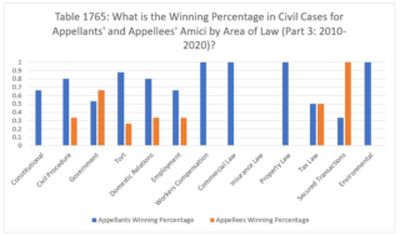- with readers working within the Retail & Leisure industries
Between 2010 and 2020, 212 amicus briefs have been filed at the Court in civil cases. Briefs supporting appellants have been on the winning side in 71.43% of cases, while briefs supporting appellees have prevailed in only 29.07%.
All appellants' amici in four subjects prevailed: workers compensation, commercial law, property law and environmental law. 87.88% of appellants' amici in tort cases won and 80% of domestic relations and civil procedure appellants' amici did. Two-thirds won in constitutional law and employment law. Only 53.13% of appellants' amici in government and administrative law won and only half in tax law did.
None of the appellees' amici in workers compensation, insurance or environmental law won. Appellees' amici in constitutional law were 0-16. Leaving aside the two successful appellees' amici in secured transactions, government and administrative law was next at a 66.67% success rate. Half of the appellees' amici in tax law won. One-third did in civil procedure, domestic relations and employment law. Only 26.09% of appellees' amici in tort law wound up winning.

Join us back here next time as we review the data for criminal cases.
The content of this article is intended to provide a general guide to the subject matter. Specialist advice should be sought about your specific circumstances.
[View Source]
